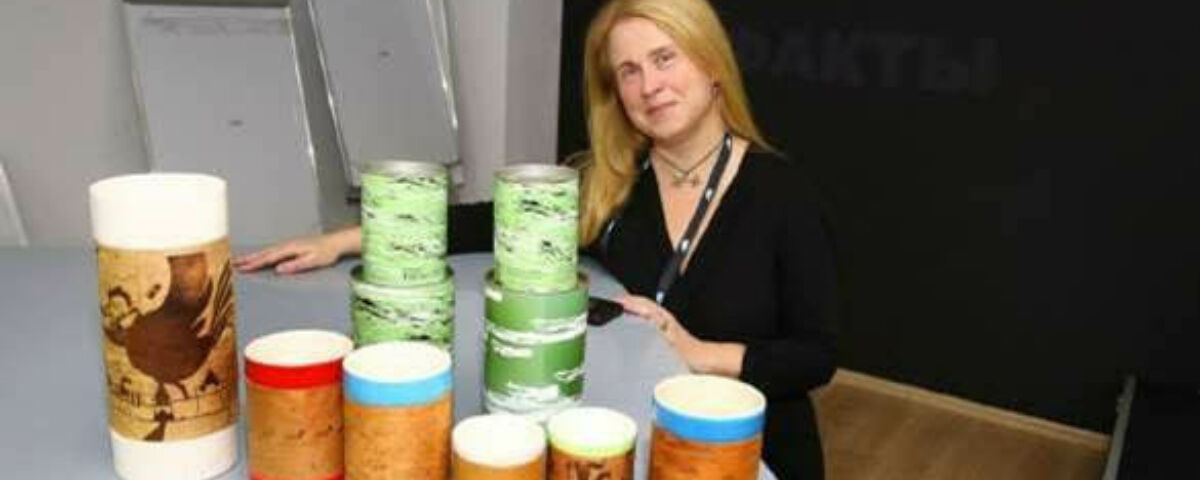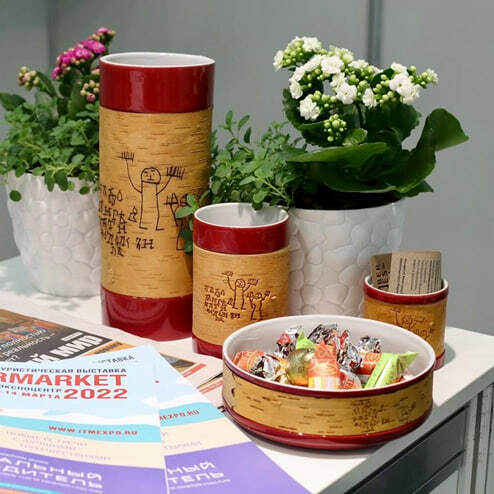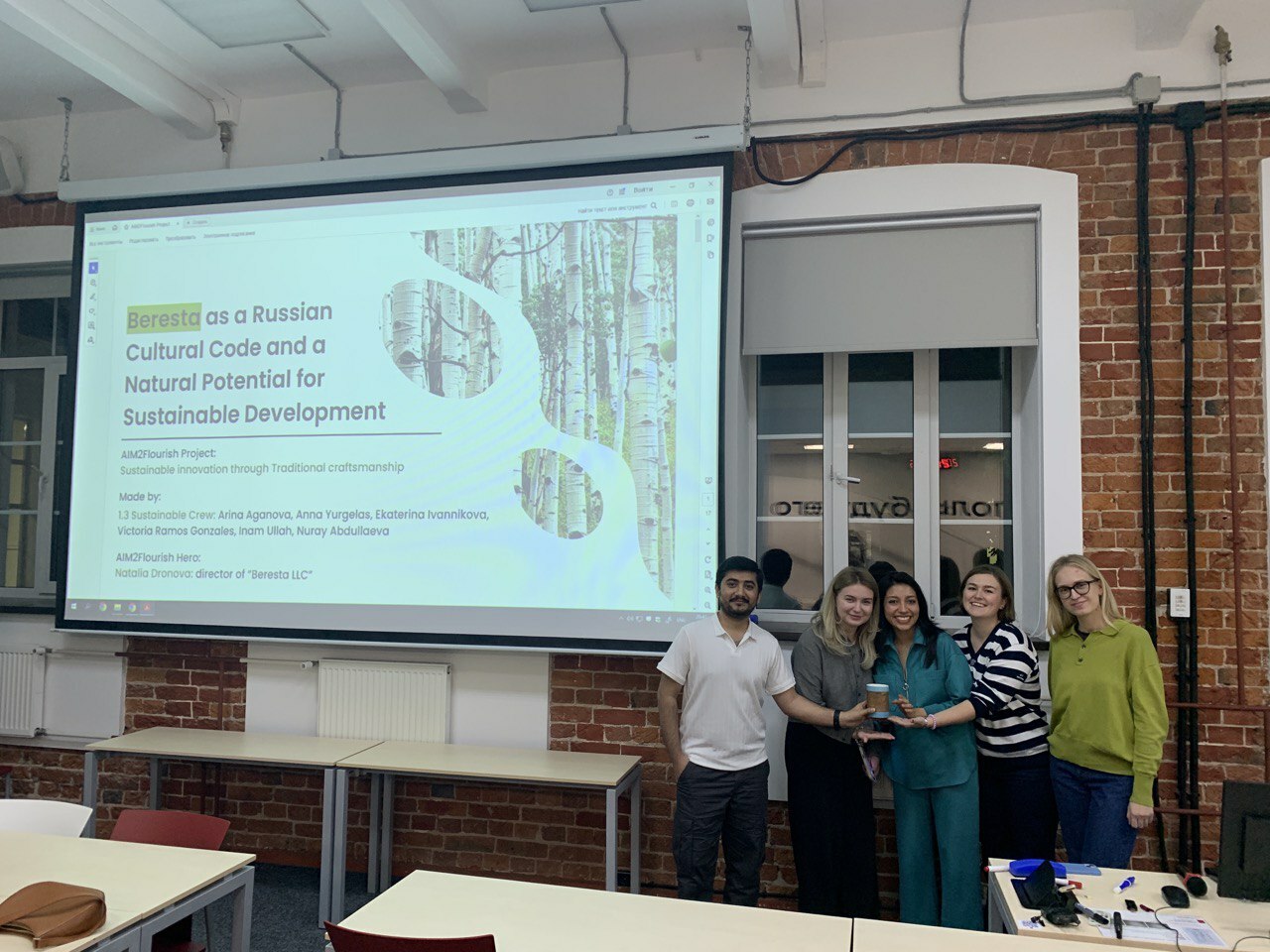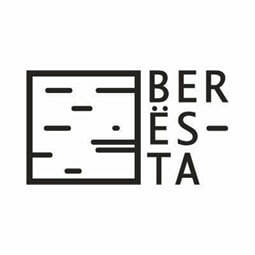





Keep this story going! Share below!
Beresta Project is a Russian social enterprise that revitalizes traditional birch bark craftsmanship by merging it with modern porcelain design, creating sustainable, glue-free tableware and home decor. Their innovation transforms birch bark—a historically underutilized material—into luxurious, eco-friendly products, supporting local artisans and promoting responsible consumption. By sourcing birch bark from logging waste and collaborating with regional craftspeople and cultural institutions, the company addresses SDG 8, SDG 9, SDG 12, SDG 15, and SDG 17, fostering cultural preservation, economic empowerment, and environmental sustainability.
Beresta has developed a unique product that merges porcelain and birch bark through a traditional, glue-free assembly method known as the Russian lock. With a focus on cups —the brand’s hallmark —this combination combines a porcelain base with a birch bark overlay with writing. As Operational Director Natalia Dronova explains, “It’s a prefabricated structure consisting of a porcelain blank, made according to special drawings, and a strip of birch bark placed in a niche without glue, using the traditional Far Eastern lock that was always used to close tues boxes. So in this case, this product is a combination of tradition and the modern technological stage of building society”. This approach combines centuries-old Russian craft traditions with modern design and industrial production standards. The innovation lies in turning birch bark, historically used in crafts and writing, into a functional material for contemporary tableware.
The idea comes from the designer’s attempt to reintroduce Novgorod's porcelain into everyday life as a durable, environmentally friendly material. After discovering that most porcelain factories in Russia had closed, Natalia’s team created their production system by connecting multiple regional production sites: birch bark processing in the Novgorod region, porcelain production in Dulevo, Moscow region, and packaging and assembly facilities in Khimki (another direction of the Moscow region). Natalia recalls the difficulty of “needing to connect several regions,” which ultimately affected the price but allowed the company to “maintain a certain level of quality control.” Initially, the team expected ceramics to be more accessible materials, but as Dronova notes, “Economics showed that porcelain was cheaper, stronger, and lighter.” This business model helped preserve craft authenticity while also providing industry-level quality control. The innovation came through experimentation, logistical coordination, and a degree of adaptation to current conditions.
The innovation is guided by a mission to revive traditional Russian crafts and preserve cultural identity. As Natalia explains, “We are modernizing and updating the birch bark craft. This is our task, our mission for the future.” The company aims to make birch bark, once viewed as a souvenir material, a symbol of Russian craftsmanship and ecological awareness. The project aims to restore dignity to craft professions, promote appreciation for natural materials, and demonstrate that heritage-based innovation can succeed in modern markets.

The inspiration for Beresta’s innovation emerged from both necessity and vision. Natalia Dronova, the Founder and Operational Director of Beresta Project, together with the industrial designer Marina Turlay, initially hoped to revive porcelain and faience, which had long been part of everyday Soviet households. These materials were durable and widely recognized, but after the fall of the Soviet Union, most factories closed and production nearly vanished. Realizing this path was no longer possible, the founders of Beresta turned toward something new. They experimented with combining porcelain with birch bark, drawing on regional craftspeople and centuries-old techniques. The result was not a sudden breakthrough but the outcome of careful testing, learning from constraints, and adapting tradition to modern needs —for instance, to the evolving idea of socially responsible tourism.
The driving motivation behind the Beresta Project’s work was to restore value to a fading craft and to prove that cultural heritage can inspire sustainable business. From the beginning, the founders of the Beresta Project wanted to move birch bark away from its image as a cheap souvenir and show its deeper meaning. As Natalia explained: “For me, birch bark is a cultural code; it tells us a lot about Russianness and our mentality, which is emotional, rooted in tradition, and very different from the Western way of thinking, even mentality". By positioning birch bark this way, the company linked cultural identity with ecological responsibility, offering an alternative to disposable, plastic-based consumption (SDG 12).
The purpose of the Beresta Project was never limited to producing objects. The company sought to support local artisans, promote Russian natural resources, and demonstrate that innovation could respect the past while addressing future needs. Their business model required connecting suppliers, craftspeople, and regional partners into a single system—an approach that aligns with SDG 17. This sense of collaboration and mission underlines why the project is both social and environmental. As Natalia summarized, “We wanted to prove that birch bark is not just a disposable souvenir material, but something luxurious, pleasant, and necessary in the 21st century.”
The Beresta Project’s innovation has transformed both the brand and the industry it operates in. This unique approach allowed the company to move beyond the souvenir market and position itself in the modern design and tableware market, emphasizing cultural heritage and sustainable use of materials.
The innovation strengthened the company’s brand identity by merging traditional Russian craftsmanship with modern sustainable aesthetics. It also fostered collaborations with museum-reserves and cultural institutions, expanding Beresta Project’s visibility and credibility in the creative industries.
The Beresta Project’s integration of birch bark and porcelain has created a unique value proposition, allowing the brand to move from the souvenir market to the premium tableware and design sector. This innovation has strengthened the company’s brand identity, attracting partnerships with museums and cultural institutions, which enhance credibility and visibility. By controlling production across several locations in the Novgorod region and in Khimki, Beresta ensures quality and consistency despite logistical challenges, as Natalia told us: “Assembly, packaging, and everything else is also under our control.”
The project’s focus on cultural storytelling and educational campaigns has also differentiated it in the market, fostering consumer awareness and loyalty and positioning Beresta as a leader in the sustainable, heritage-inspired design niche. This strategic approach has not only expanded the company’s market reach but also laid the foundation for long-term growth and scalability. In the long term, the innovation has positioned Beresta as a catalyst for reviving domestic porcelain production and raising consumer awareness of Russian-made, sustainable goods, contributing to the resilience of the local craft economy.
The environmental impact of the Beresta Project is notably positive. The company sources birch bark exclusively from trees that have already been felled by loggers, turning what would otherwise be forestry waste into a valuable raw material. This prevents unnecessary tree cutting and supports circular resource use. Natalia explained: “The birch bark that is removed is literally peeled off from felled trees… They just use this bark to heat the furnace. We use this waste to create new products.” Additionally, bark is collected only during a 1–1.5-month seasonal window when trees naturally shed bark without harm, ensuring sustainability. The process contributes to waste reduction (SDG 12)and the preservation of biodiversity (SDG 15), while the products themselves serve as a natural alternative to plastic in household use.
The Beresta Project’s innovation has had a transformative effect on society. One of the most tangible impacts of the brand has been the substantial increase in income for birch bark craftsmen, directly contributing to SDG 8. As Natalia Dronova highlighted: "I can tell you for sure that my birch bark craftsmen have started to earn many times more, and not only because we give them more money and orders, but simply because the demand for birch bark has definitely increased."
This economic uplift has improved artisans' livelihoods, providing them with stable, dignified employment opportunities while preserving their unique cultural heritage. Beyond financial gains, the Beresta Project has played a crucial role in changing public perception and awareness of birch bark. Through educational initiatives, such as films and collaborations with museums, Beresta has brought visibility to the craft and its practitioners. Dronova noted: "With this film... I think that before that, no one understood who birch bark craftsmen were, what they were like, what they did, how it worked, and why."
The innovation also extends to the sensory and psychological benefits of working with birch bark. Dronova emphasized its tactile and sensory qualities, stating, "I see this as the work of the future. I can clearly see the effect of birch bark on motor skills. Birch bark itself is very tactile and sensory. And in our 21st century, I think it's a very important element of our moral and psychological health." In an era dominated by digital interactions, the brand’s focus on hands-on craftsmanship offers a meaningful counterbalance, promoting mindfulness, creativity, and a deeper connection to cultural roots. This aspect of the innovation underscores the importance of preserving traditional crafts not just for their economic value, but also for their role in enhancing human well-being, in line with SDG 3 and SDG 8.
However, the Beresta project also acknowledges the challenges of sustaining traditional crafts in a modern creative economy. Dronova pointed out: "The problem is that a master class is professional entertainment. In essence, there's probably no such thing as someone wanting to make this their profession." While master classes and educational initiatives raise awareness, they often remain a form of entertainment rather than a pathway to professional craftsmanship. This highlights the need for broader systemic support—such as vocational training programs, fair wages, and market access (plans explicitly to come to market chains to distribute products) —to ensure the long-term viability of such professions, in line with SDG 8’s emphasis on promoting sustained, inclusive, and sustainable economic growth.
The Beresta Project is contributing to a shift in modern trade by demonstrating the value of sustainable and culturally rooted products. Dronova expressed her vision for the future: "I think that attention to such projects, the ability to work with them, is what really characterizes modern trade. And it is changing, it must change." By fostering partnerships with cultural institutions (SDG 17) and promoting consumer awareness, the project is helping to redefine trade practices, encouraging a move toward more ethical, sustainable, and culturally meaningful consumption. This shift not only benefits artisans and local communities but also sets a precedent for how traditional crafts can thrive in a glocalised market, supporting decent work, economic growth, and sustainable development.
Get stories of positive business innovations from around the world delivered right to your inbox.
Natalia Dronova, Operational Director, Founder, Social Entrepreneur


Founded in 2019, Beresta Project (BERЁSTA) LLC. is a Russian craft brand that merges traditional birch bark craftsmanship with modern porcelain design. The company creates sustainable tableware and home decor using a glue-free Russian lock technique, transforming birch bark—a historically underappreciated material into luxurious, environmentally friendly products.
Headquartered in Shimsk (Novgorod region) and with a business hub in Khimki (Moscow region), Beresta supports local artisans by sourcing birch bark sustainably from logging waste, ensuring minimal environmental impact. The company also collaborates with museums and museum reserves and serves as a filmmaker to produce educational content, raising awareness of birch bark’s cultural and ecological significance.
Beresta’s purpose is to revive traditional local crafts in the XXI century, to bring them into contemporary design and lifestyle, promote sustainable consumption, and empower artisans while fostering economic growth in rural communities. By blending heritage with innovation, the company offers a model for a culturally conscious, regenerative business in the modern market.